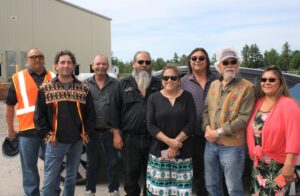David Suzuki visits Henvey Inlet First Nation, discusses renewable energy project

By Jennifer Ashawasegai-Pereira
HENVEY INLET FIRST NATION— “I’m trying to not fly to places anymore,” David Suzuki tells Henvey Inlet First Nation Gimaa Wayne McQuabbie, who quickly quipped, “Yeah, it’s hard on your arms.” They both chuckled together, along with the rest of Council and a few Pattern Canada employees.
Suzuki had been travelling across Canada in an electric vehicle by Volvo. It took eight days from Vancouver to Toronto. Suzuki is most known and well-loved for hosting a television show, The Nature of Things. He flew around the country and overseas. A lot. He realizes the carbon footprint of jets and hasn’t flown for just about three years. He’s doing his best to quit flying. He’s been promoting his journey on social media while travelling with his wife and a two-person film crew.
He made a number of pit stops across Canada to learn about different renewable energy projects and looking at ways to electrify the country. Suzuki made it a point to drop by Henvey Inlet Wind, which is a 300 MW wind energy centre in Henvey Inlet First Nation. The community developed the project in a 50-50 partnership with Pattern Canada and HIFN’s power company, Nigig Power Corporation.
The wind energy centre includes 87 Vestas wind turbines on a 500 acre footprint on HIFN land. A 104 kilometre transmission line was also built to plug in near Parry Sound to provide power to the grid in Southern Ontario. It’s a significant project in Canada because it’s the largest wind farm on First Nation land so far and first large-scale development of it’s kind under the First Nations Lands Management Act.
It’s projects like these that Suzuki likes to hear about. He had a lot of questions for the Chief during their brief meeting on June 3. He wanted to know the size of the project, Anishinabek and Indigenous participation, along with future endeavours.
“Henvey Inlet First Nation is an example that this can be done,” he told Gimaa McQuabbie.
“It’s our contribution to the environment and I’m really proud of our achievements,” commented Gimaa McQuabbie, “Climate change is happening right now.”
While Canada has made several international commitments and is planning to reduce emissions by 40-45% from 2005 levels by 2030 and achieve Net-Zero emissions by 2050, a report by the David Suzuki Foundation indicates achieving Net-Zero can be done by 2035. That’s 15 years earlier than the political commitment, but there’s a lot of work to get there such as building and repairing infrastructure.
“We have to overhaul the grid in order to enable that to happen,” said Suzuki.
Only thinking 28 years ahead is short-sighted thinking on behalf of the government and Suzuki amplifies and supports the Anishinabek value of seven generational Anishinabek thinking.
“Politicians and companies don’t think that long. Politicians think about the next election and companies want to make money,” he expressed.
Suzuki commended Gimaa McQuabbie on the wind farm and asked about challenges. Gimaa discussed a few of the challenges, including governmental red tape.
“A wind farm will die a thousand deaths, and ours did, but we never gave up,” stated Gimaa McQuabbie.

